Though your chickens can indeed get by on a diet consisting of mostly dry, hard pellets it is safe to say that they will probably enjoy a little variety in their menu.
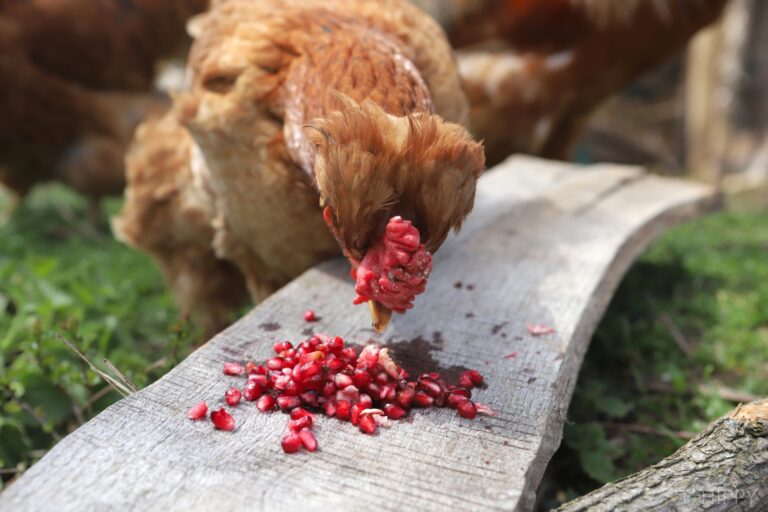
One of the best ways to give your chickens something interesting to snack on while also improving their overall nutrition is by feeding them produce. Left to their own devices, chickens eat all kinds of plant matter, so it makes sense we could give them a little bit also.
Let’s look at fruit. Do chickens like fruit, and is it safe for them?
Yes, most kinds of fruit are safe for chickens and can provide them with valuable vitamins and minerals. However, some fruits have toxic seeds or pits that should be removed before feeding, and a chicken’s fruit intake should be moderated so they don’t get too much.
Most chickens really love fruit, and though they are all individuals it is a safe bet that they will enjoy whatever sweet morsels you deem fit to give them.
This makes sense because there are plenty of fruit-bearing plants the chickens are naturally drawn to, specifically berries. But you can give them a lot more than berries as you will learn below…
What Benefits Does Fruit Have for Chickens?
Feeding fruit to chickens, so long as it is done in moderation, is a great way to enhance their health by boosting their intake of needed vitamins and minerals.
Every fruit varies, and no fruit is nutritionally complete for the needs of chickens, but many are extremely nutritious- and also delicious!
In any case, fruits will supply nutrients that will boost your birds’ immune systems, help them fight off free radicals that can cause cellular degradation or organ damage, improve the formation of new red blood cells and circulatory health and even help their skin, bones and connective tissues grow and heal from damage.
Also noteworthy is that many kinds of fruit contain essential nutrients that can promote feathering, the process of growing replacement or new feathers, when a chicken is injured or when they are just undergoing the yearly molt which is a regular occurrence.
Also, you shouldn’t neglect the simple fact that fruit is a great source of quick energy and also some hydration. For beating heat stress, fruit is a great option.
You’ve got lots of good reasons to give fruit to your flock, you just need to be careful to give them the right kinds and in the right portions. I’ll tell you more in the next section.
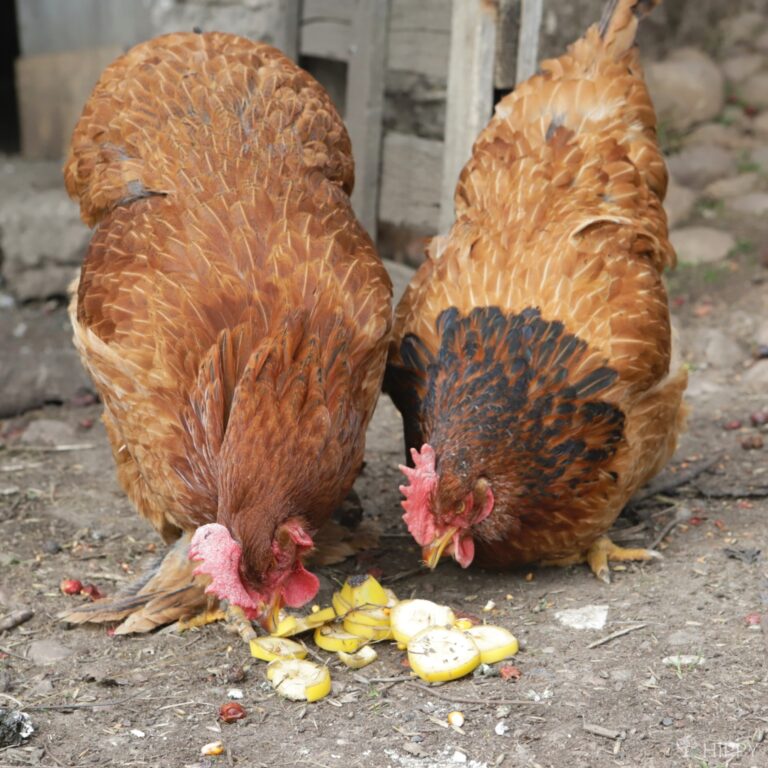
What Kind of Fruit Can Chickens Eat?
Chickens can eat most kinds of fruit with no problems at all, so long as they get them in moderation as part of a balanced diet.
Chickens don’t need fruit all the time, no matter how much they like it and how healthy it is!
The following fruits are all safe for chickens:
- Apples
- Elderberries
- Grapes
- Apricots
- Bananas
- Blueberries
- Pumpkins
- Strawberries
- Blackberries
- Raspberries
- Pears
- Peaches
- Plums
- Tomatoes (Botanically a fruit, you know!)
- Watermelon
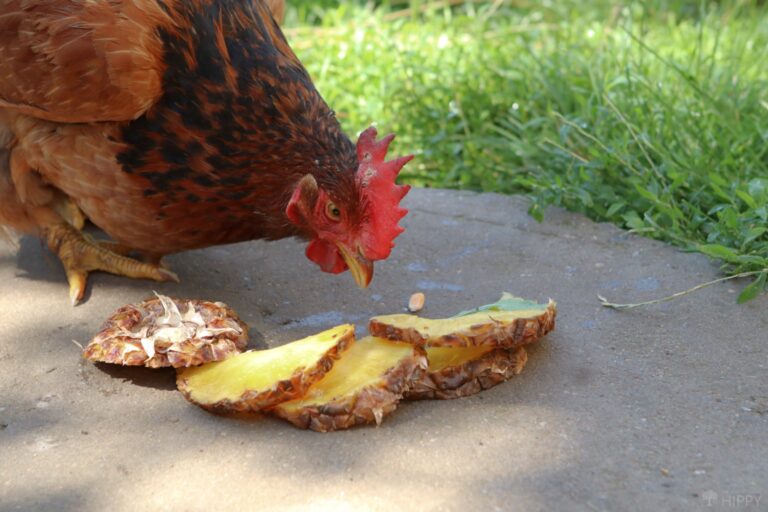
Fruits that Chickens Should Eat Only Occasionally
There are plenty of other fruits that are still safe and healthy for chickens, but only in sharply limited amounts.
This could be because they contain lots of sugar, are highly acidic or have other characteristics that could become harmful when chickens eat too much.
Give the following fruits to your chickens sparingly:
- Lemons
- Limes
- Mango
- Oranges
- Juniper Berries
- Pineapple
- Jackfruit
- Raisins
- Figs
- Dates
Fruits that Chickens Should Not Eat
Not every fruit is okay for chickens. You should not feed some fruits to chickens no matter what, or certain parts of some safe fruits.
Never give your birds the ones on this list:
- Avocado – Skin and pit contain persin, a toxin. Flesh might contain toxin.
- Yew “berries” – All parts of plant are deadly poisonous.
- Apple and pear seeds – Contain compounds that convert to cyanide when ingested.
- Stone fruit pits – Peach and apricot pits also contain cyanide precursors
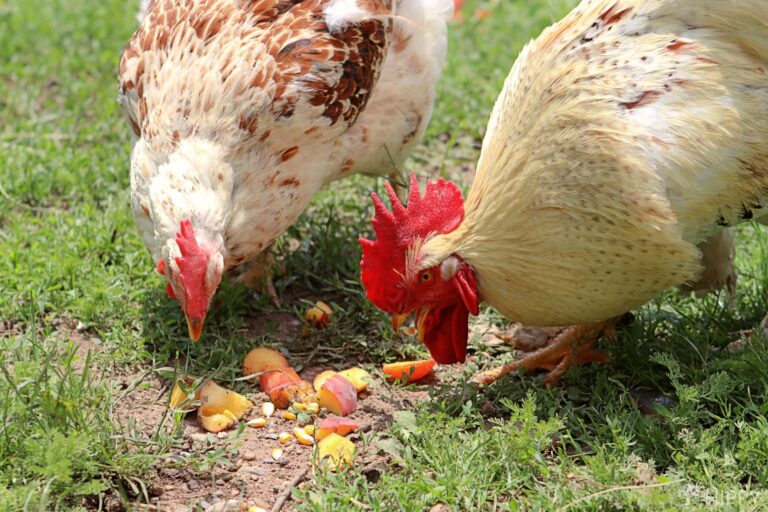
Is Fruit Safe for Chickens Raw?
Yes, typically speaking any fruit that a chicken can eat is safe when raw. Raw fruit always has an advantage over cooked, processed or preserved fruits because it will contain the maximum amount of nutrients, both vitamins and minerals.
Any method of cooking, and any method of preservation, will deplete nutrient levels somewhat. If a type of fruit has lots of nutrients to spare, this isn’t that big of a deal.
But if it is one that has relatively few nutrients, like lemons, you definitely want to avoid cooking it.
Can You Cook Fruit to Give it To Chickens?
Yes, again assuming that the fruit in question is already safe for chickens to consume. But you should know that there’s not much reason to cook fruit if you’re going to give it to chickens.
Those kinds of fruit are already extremely tender and easy for chickens to eat, sometimes after being peeled or split by you, and cooking will degrade the nutrients in the fruit as mentioned above.
if for whatever reason you have some cooked fruit on hand did you aren’t going to eat or preserve and you want to give it to your flock, feel free, but don’t feel inclined to do so and definitely don’t give them any cooked fruit that has added ingredients.
That can be really bad news for your birds, and we’ll talk more about that a little later.
Are Seeds and Pits Safe for Chickens?
The seeds of many fruits are safe for chickens, but you have to take this on a case-by-case basis.
The seeds of many berries are completely harmless, whereas the seeds of apples and peach pits contain cyanide precursors that could make your chickens terribly sick or even kill them if eaten.
For instance, aside from apple seeds and peach pits, you don’t want to give your chickens the pits of apricots and you definitely want to avoid the big pits of avocados.
Are Peels and Skins Safe for Chickens?
The pills and skins of most fruits are safe for chickens to eat, or at least non-harmful. Some very soft fruits, like peaches, have skins that offer such little resistance they are likely to be gobbled up with the flesh.
Other fruits, like watermelons, are so tough that it is unlikely any but the largest and strongest chickens will be able to break into it to get at the sweet stuff within.
Much of the time if a fruit is safe for chickens to eat they can also eat the skin or peel safely, but you shouldn’t force them to.
Is Fruit Still Safe for Chicks?
If the fruit is safe for adult chickens it is nominally safe for chicks. However, because chicks are so small and because their systems are underdeveloped they might be more vulnerable to negative outcomes when eating fruit.
Whereas chickens might gobble down seeds, young chicks could choke on them. The sugar content and moisture present in many fruits could seriously upset the digestive tracts of chicks, and if it causes diarrhea they might dehydrate and die.
Chicks are also more vulnerable two conditions like crop impaction and other problems, issues which can be exacerbated by the consumption of fruit.
In short, your chicks can have fruit but you are advised to let them get a little older before you give it to them for the first time.
For safety, once they reach about 6 weeks of age they will probably be ready and raring for their first taste of sweet, delicious fruit.
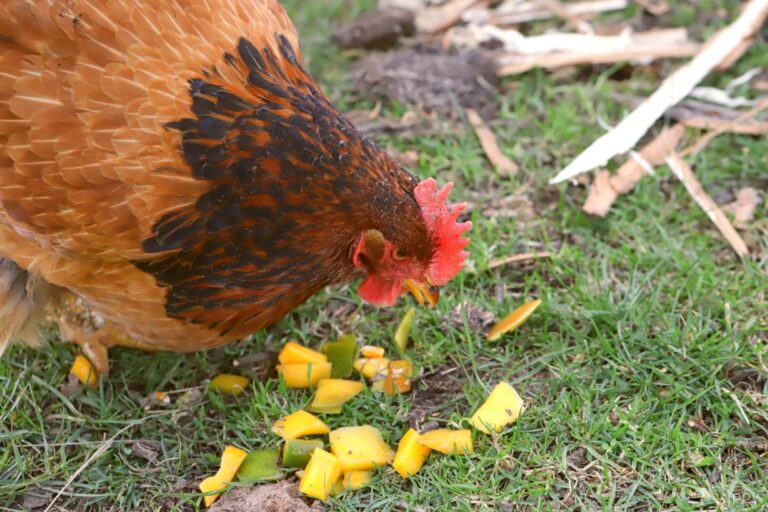
How Frequently Can Fruit Be Fed to Chickens?
One or two small servings per week.
Fruit has so many advantages and it’s so healthy for chickens, it seems like something they should eat all the time, right? It would seem that way, but reality says otherwise.
Simply stated, domestic chickens generally do best on a diet that consists of mostly chicken feed, one that is supplemented by a relatively small amount of fresh produce and other whole foods, including fruit.
Fruit is healthy, for sure, but eating too much of it can cause problems for chickens and so you only want to give it to them in limited quantities as part of a well-rounded diet. We’ll talk about some of these problems in the next section.
How Can Fruit Be Problematic for Chickens?
Most fruits are high in two things: sugar, and moisture.
Seasoned keepers already know that this can be troublesome for chickens because both together tend to create unfavorable conditions in a chicken’s body, specifically in the gizzard, stomach and crop.
Yeast infections are one potential outcome as are blooms of bacteria that can subsequently spread. Sugar and high-moisture foods also tend to create loose stools in a chicken, or even lead to full-blown diarrhea.
This, aside from being hideously nasty and messy when it comes time for you to clean up after them, will also rapidly dehydrate a chicken and lead to electrolyte depletion which can cause more problems.
The solution, though, is a simple one: limit your chickens’ intake of fruit, and make the vast majority of their diet dry foods.
Never Serve Fruit to Chickens if it Has Added Ingredients
Most fruit is absolutely delicious on its own, but of course, we humans are just not content to leave well enough alone and have used fruit as ingredients in all sorts of delectable desserts.
Truly, some of them are amazing, but we should never give them to our chickens no matter how much we want to share with them.
Added sugar, butter, oils, processed ingredients, preservatives, salt and so forth are all very bad for chickens and can lead to other, equally devastating illnesses on their own.
Don’t Leave Fruit Scraps Around the Run or Coop
Serving fruit to your chickens is definitely fun. Most chickens seem to really like fruit, and you’ll notice a major pep in their step after they get a little bit of the sweet stuff. But, when the party’s over, make sure you clean up after them.
The sweet aroma of fruit will rapidly attract insects, pests and even predators which can make life hell for your chickens and thusly for you.
By getting rid of the leftover scraps you will reduce the chances that these unwanted visitors will stop by in the first place.
Tim is a farm boy with vast experience on homesteads, and with survival and prepping. He lives a self-reliant lifestyle along with his aging mother in a quiet and very conservative little town in Ohio. He teaches folks about security, prepping and self-sufficiency not just through his witty writing, but also in person.
Find out more about Tim and the rest of the crew here.
